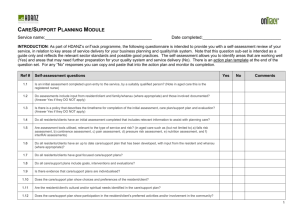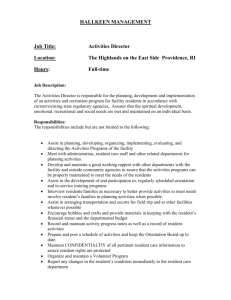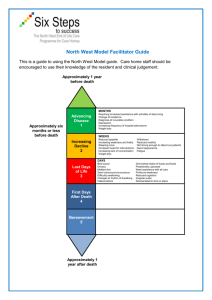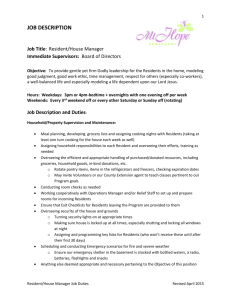`CORE SERVICES` Logic Model - Oregon Opportunity Network
advertisement
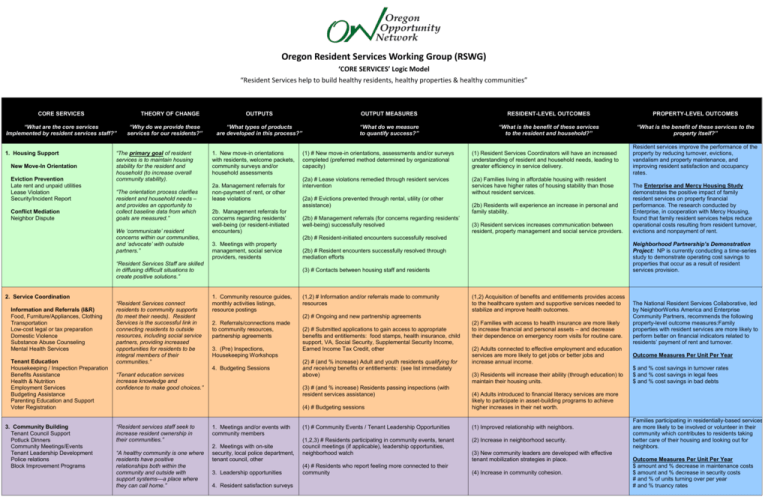
Oregon Resident Services Working Group (RSWG) ‘CORE SERVICES’ Logic Model “Resident Services help to build healthy residents, healthy properties & healthy communities” CORE SERVICES THEORY OF CHANGE “What are the core services Implemented by resident services staff?” 1. Housing Support New Move-In Orientation Eviction Prevention Late rent and unpaid utilities Lease Violation Security/Incident Report Conflict Mediation Neighbor Dispute “Why do we provide these services for our residents?” “The primary goal of resident services is to maintain housing stability for the resident and household (to increase overall community stability). “The orientation process clarifies resident and household needs – and provides an opportunity to collect baseline data from which goals are measured.” We ‘communicate’ resident concerns within our communities, and ‘advocate’ with outside partners.” OUTPUTS OUTPUT MEASURES RESIDENT-LEVEL OUTCOMES PROPERTY-LEVEL OUTCOMES “What types of products are developed in this process?” “What do we measure to quantify success?” “What is the benefit of these services to the resident and household?” “What is the benefit of these services to the property itself?” 1. New move-in orientations with residents, welcome packets, community surveys and/or household assessments 2a. Management referrals for non-payment of rent, or other lease violations 2b. Management referrals for concerns regarding residents’ well-being (or resident-initiated encounters) Information and Referrals (I&R) Food, Furniture/Appliances, Clothing Transportation Low-cost legal or tax preparation Domestic Violence Substance Abuse Counseling Mental Health Services Tenant Education Housekeeping / Inspection Preparation Benefits Assistance Health & Nutrition Employment Services Budgeting Assistance Parenting Education and Support Voter Registration 3. Community Building Tenant Council Support Potluck Dinners Community Meetings/Events Tenant Leadership Development Police relations Block Improvement Programs “Resident Services connect residents to community supports (to meet their needs). Resident Services is the successful link in connecting residents to outside resources, including social service partners, providing increased opportunities for residents to be integral members of their communities.” 1. Community resource guides, monthly activities listings, resource postings (2a) Families living in affordable housing with resident services have higher rates of housing stability than those without resident services. (2a) # Evictions prevented through rental, utility (or other assistance) (2b) # Management referrals (for concerns regarding residents’ well-being) successfully resolved (2b) Residents will experience an increase in personal and family stability. (3) Resident services increases communication between resident, property management and social service providers. Resident services improve the performance of the property by reducing turnover, evictions, vandalism and property maintenance, and improving resident satisfaction and occupancy rates. The Enterprise and Mercy Housing Study demonstrates the positive impact of family resident services on property financial performance. The research conducted by Enterprise, in cooperation with Mercy Housing, found that family resident services helps reduce operational costs resulting from resident turnover, evictions and nonpayment of rent. Neighborhood Partnership’s Demonstration Project: NP is currently conducting a time-series study to demonstrate operating cost savings to properties that occur as a result of resident services provision. (2b) # Resident encounters successfully resolved through mediation efforts (1,2) # Information and/or referrals made to community resources (1,2) Acquisition of benefits and entitlements provides access to the healthcare system and supportive services needed to stabilize and improve health outcomes. (2) # Ongoing and new partnership agreements 2. Referrals/connections made to community resources, partnership agreements 3. (Pre) Inspections, Housekeeping Workshops 4. Budgeting Sessions “A healthy community is one where residents have positive relationships both within the community and outside with support systems—a place where they can call home.” (2a) # Lease violations remedied through resident services intervention (3) # Contacts between housing staff and residents “Tenant education services increase knowledge and confidence to make good choices.” “Resident services staff seek to increase resident ownership in their communities.” (1) Resident Services Coordinators will have an increased understanding of resident and household needs, leading to greater efficiency in service delivery. (2b) # Resident-initiated encounters successfully resolved 3. Meetings with property management, social service providers, residents “Resident Services Staff are skilled in diffusing difficult situations to create positive solutions.” 2. Service Coordination (1) # New move-in orientations, assessments and/or surveys completed (preferred method determined by organizational capacity) (2) # Submitted applications to gain access to appropriate benefits and entitlements: food stamps, health insurance, child support, VA, Social Security, Supplemental Security Income, Earned Income Tax Credit, other (2) # (and % increase) Adult and youth residents qualifying for and receiving benefits or entitlements: (see list immediately above) (3) # (and % increase) Residents passing inspections (with resident services assistance) 1. Meetings and/or events with community members 2. Meetings with on-site security, local police department, tenant council, other 3. Leadership opportunities 4. Resident satisfaction surveys (2) Families with access to health insurance are more likely to increase financial and personal assets – and decrease their dependence on emergency room visits for routine care. (2) Adults connected to effective employment and education services are more likely to get jobs or better jobs and increase annual income. (3) Residents will increase their ability (through education) to maintain their housing units. (4) # Budgeting sessions (4) Adults introduced to financial literacy services are more likely to participate in asset-building programs to achieve higher increases in their net worth. (1) # Community Events / Tenant Leadership Opportunities (1) Improved relationship with neighbors. (1,2,3) # Residents participating in community events, tenant council meetings (if applicable), leadership opportunities, neighborhood watch (2) Increase in neighborhood security. (4) # Residents who report feeling more connected to their community (3) New community leaders are developed with effective tenant mobilization strategies in place. (4) Increase in community cohesion. The National Resident Services Collaborative, led by NeighborWorks America and Enterprise Community Partners, recommends the following property-level outcome measures:Family properties with resident services are more likely to perform better on financial indicators related to residents’ payment of rent and turnover. Outcome Measures Per Unit Per Year $ and % cost savings in turnover rates $ and % cost savings in legal fees $ and % cost savings in bad debts Families participating in residentially-based services are more likely to be involved or volunteer in their community which contributes to residents taking better care of their housing and looking out for neighbors. Outcome Measures Per Unit Per Year $ amount and % decrease in maintenance costs $ amount and % decrease in security costs # and % of units turning over per year # and % truancy rates




